
Managing a growing business requires moving from scattered spreadsheets to a centralized database that keeps all your records accurate. From handling inventory and sales to keeping HR and payroll organized, companies need a smarter way to keep everything connected
That’s where ERP software in Bangladesh plays a major role.
ERP systems connect your core teams Finance, HR, Sales, and Stock into a single verified source of truth. Solutions like Biznify ERP help local businesses track operations in real time, simplify decision-making, and improve team coordination across departments.
Whether you run a retail shop in Chattogram or a manufacturing unit in Dhaka, this guide compares the top ERP platforms for 2025 so you can pick the one that fits your needs.
ERP (Enterprise Resource Planning) software is a business management tool that connects your daily operations—like accounting, sales, inventory, HR, and reporting—into one single system.
Instead of juggling Excel sheets, paper documents, and WhatsApp groups, ERP software brings everything together under one dashboard.
Cloud-native ERPs allow your team to work remotely with instant data updates, so no one is looking at old numbers. Finance teams track income and expenses. Sales teams manage orders and invoices. HR can log attendance and salaries. Store managers use real-time inventory tracking to see exactly when to reorder stock before it runs out. And business owners get a full overview, without waiting for updates.
For example, a shop using Biznify ERP can manage sales through POS, handle staff payroll, sync product stock, and monitor supplier payments—without switching tools.
Most ERP systems come with core modules like:
By removing data gaps, a central ERP ensures everyone sees the same operational view of the business, ERP software helps you save time, reduce errors, and make smarter decisions fast.
Not every ERP system is designed to handle the realities of Bangladeshi businesses. We prioritized systems that offer scalability, fair ownership costs, and full support for local tax rules
Each ERP software in this list was selected based on practical benefits, not just feature lists.
Bangla interface and local support
To reduce the learning curve, we chose software with a native Bangla interface, ensuring your field staff can use it easily. We gave preference to tools that offer Bangla UI and responsive local support, so your team can ask questions and get help in real time.
NBR readiness and financial compliance
The system must generate NBR-compliant Mushak 6.3 reports to make your VAT return filing simple and digital, ERP software should work with local finance rules. Platforms that offer NBR-compatible reporting or support local tax formats were ranked higher.
Scalable for SMEs, factories, and service businesses
The software architecture must support business growth, handling thousands of transactions without slowing down. We prioritized solutions that serve both small businesses and large organizations, without forcing you to switch systems later.
Ongoing updates and support teams in Bangladesh
A one-time sale isn’t enough. We favored ERP tools with active development, regular updates, and support staff based in or familiar with the Bangladeshi market.
Demo availability and clear pricing
Businesses need to test before committing. So we looked for ERPs that offer easy demo access and transparent pricing—no hidden costs, no pressure.
We prioritized ERP platforms with modular systems, role-based dashboards, and cloud or hybrid deployment — tools that actually support business growth in Bangladesh.
Software Name |
Deployment |
Key Modules |
Best Fit |
Starting Price |
Local Support |
|---|---|---|---|---|---|
Biznify ERP |
Cloud, On-Premise |
Accounting, HRM, Inventory, POS, E-commerce, Manufacturing |
SMEs, Retailers, Manufacturers |
BDT 12,000/year |
Yes |
PrismERP |
Cloud, On-Premise |
HR, Accounting, Distribution, Custom Modules |
Large Enterprises, Distributors |
Custom Quote |
Yes |
SAP Business One |
Cloud, On-Premise |
Financials, SCM, CRM, BI |
Enterprises, Multinationals |
Varies by Partner |
Limited |
Odoo ERP (Bangladesh) |
Cloud, On-Premise |
Inventory, CRM, Sales, Finance |
Startups, Tech Companies |
Free core, paid modules |
Yes (via local vendors) |
Sunshine ERP |
Cloud |
Garments, Payroll, Order Management |
Garments, Traders |
Custom Quote |
Yes |
ZKTeco ERP |
On-Premise |
Biometric HR, Attendance, Payroll |
HR Teams, Manufacturing Units |
Custom Quote |
Yes |
TallyPrime |
On-Premise |
Accounting, Inventory, GST |
Retail, Accountants |
BDT 35,000/year |
Limited |
Pridesys ERP |
Cloud, On-Premise |
Production, Accounting, Procurement |
Factories, Manufacturers |
Custom Quote |
Yes |
erp.com.bd |
Cloud |
CRM, HR, Finance |
Local SMEs |
Custom Quote |
Yes |
iBOS ERP |
Cloud |
Sales, Purchase, Inventory, HRM |
Startups, Small Retail |
BDT 18,000/year |
Yes |
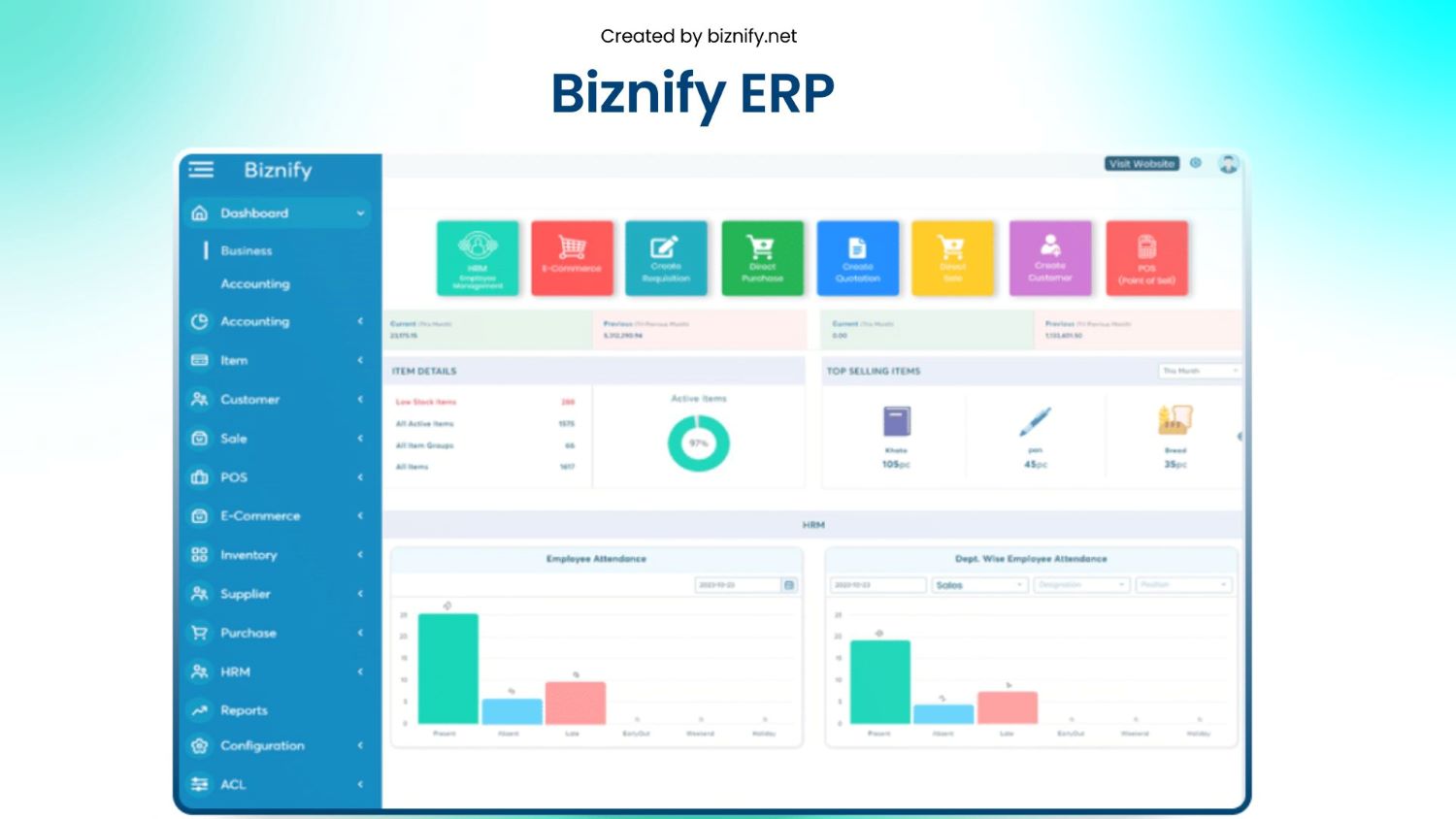
Biznify is a modular Cloud ERP built specifically for Bangladesh, offering a complete software suite for SMEs like Accounting, HRM, Inventory, POS, and Manufacturing, built to serve local SMEs with Bangla support and easy onboarding.
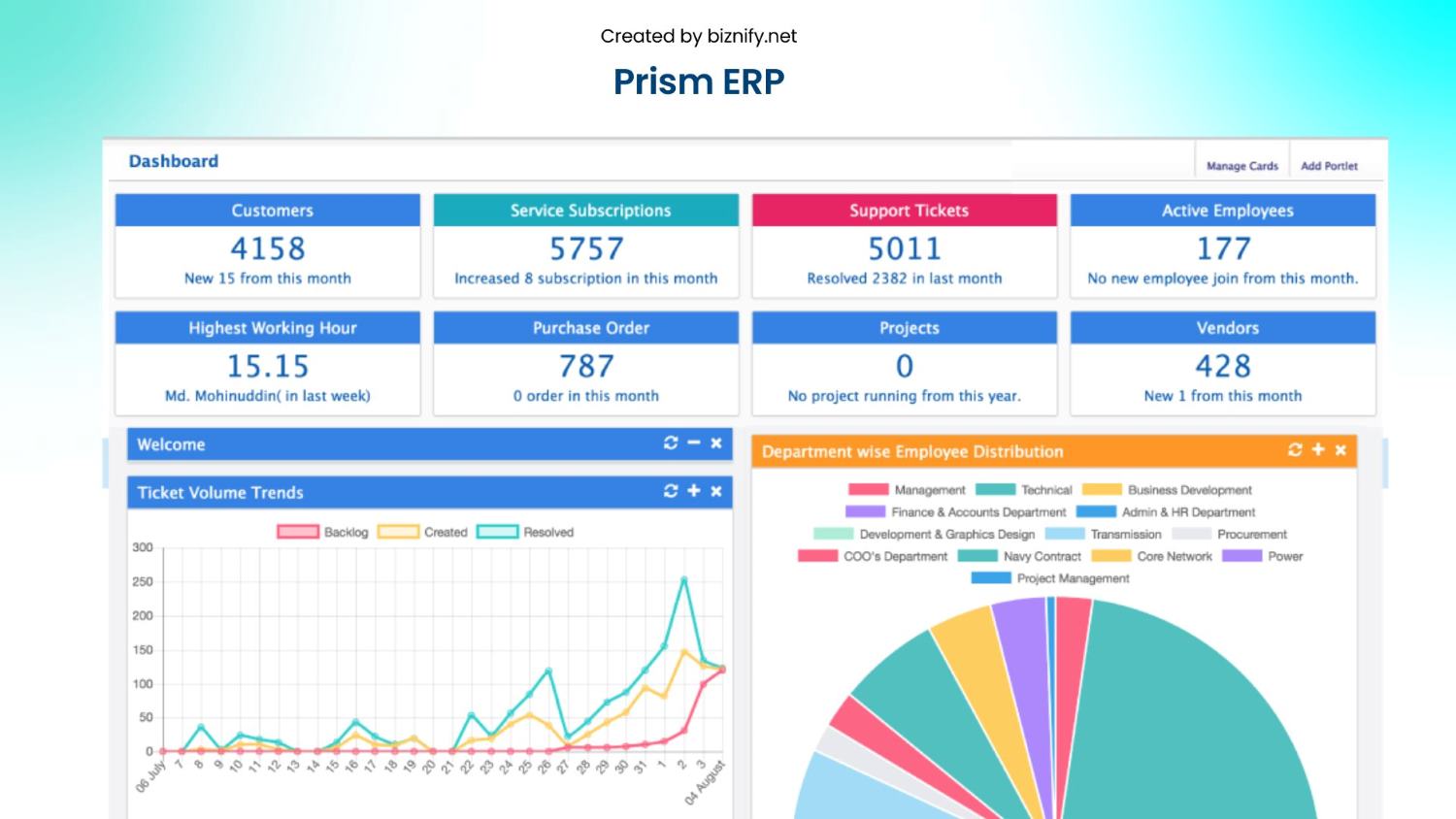
PrismERP delivers an enterprise-grade system optimized for complex supply chain and factory management for HR, Accounting, and Distribution, tailored for large businesses in Bangladesh needing customizable workflows and a robust backend.
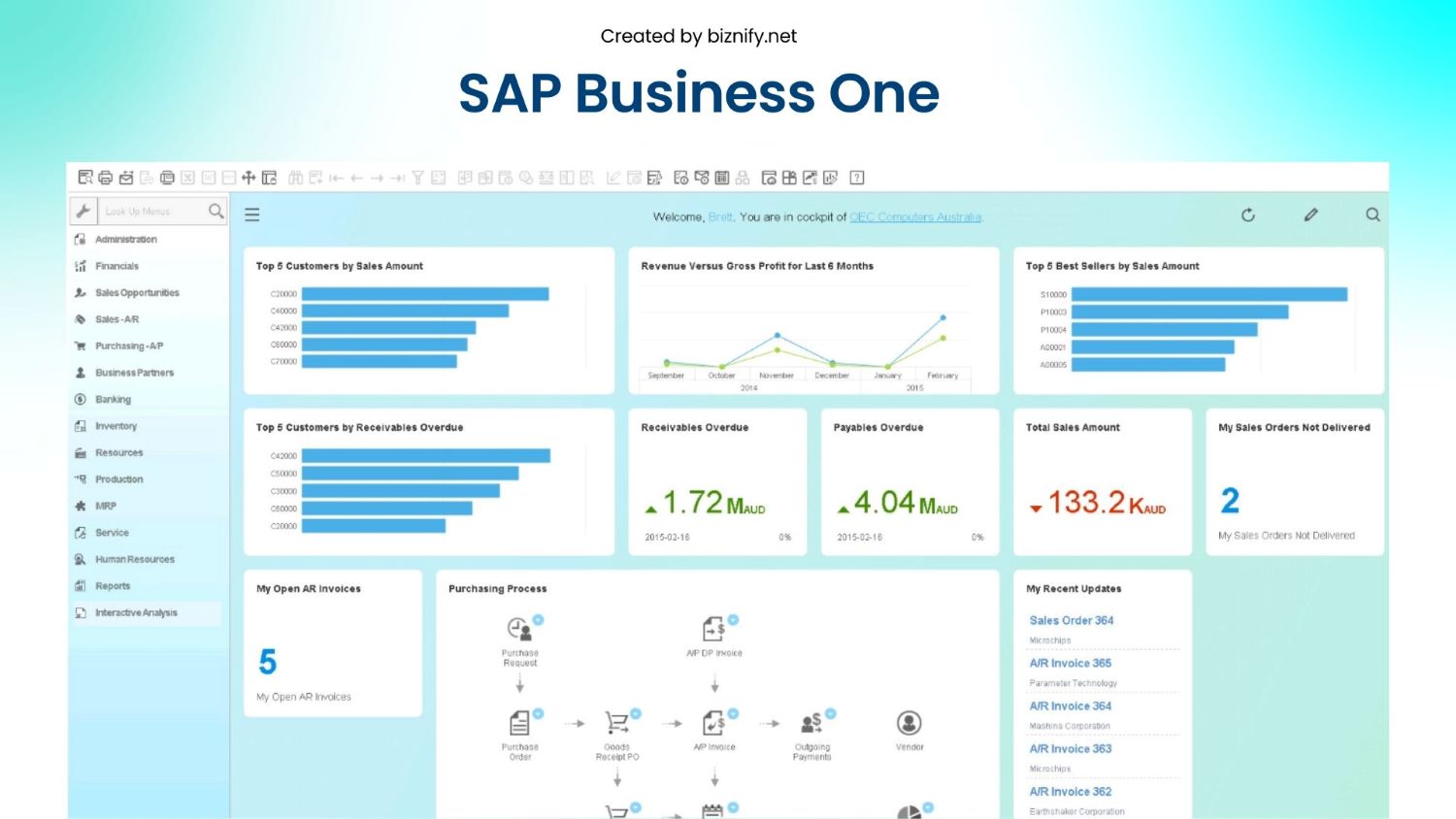
SAP Business One is the global standard for large enterprises, offering powerful Business Intelligence (BI) tools for financials, SCM, CRM, and business intelligence. It offers strong scalability but requires expert setup.
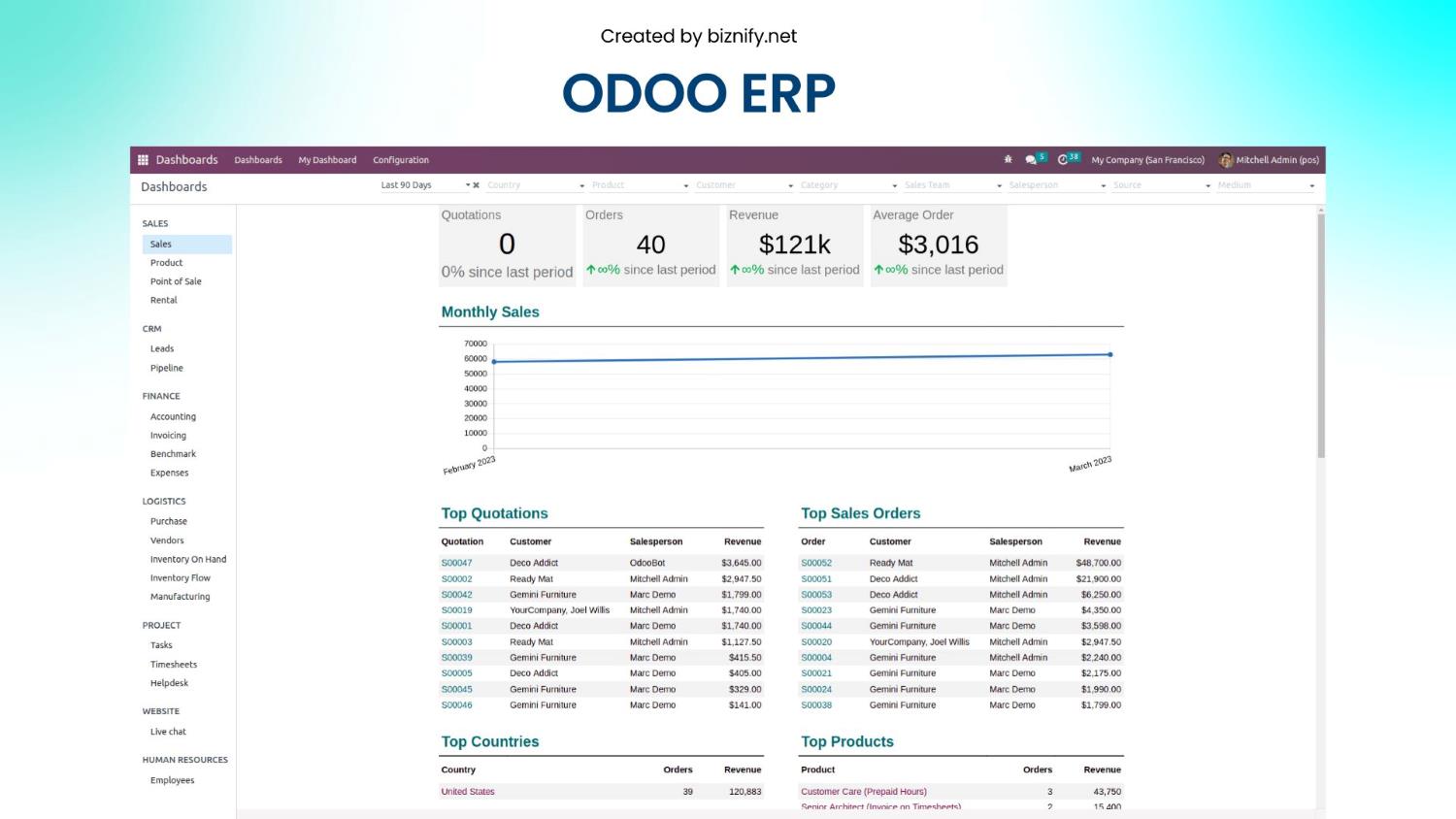
Odoo provides a flexible open-source framework, allowing developers to deeply customize the code for your needs like Inventory, Sales, and CRM. Widely used by tech companies and startups for its flexibility and cost-effectiveness.
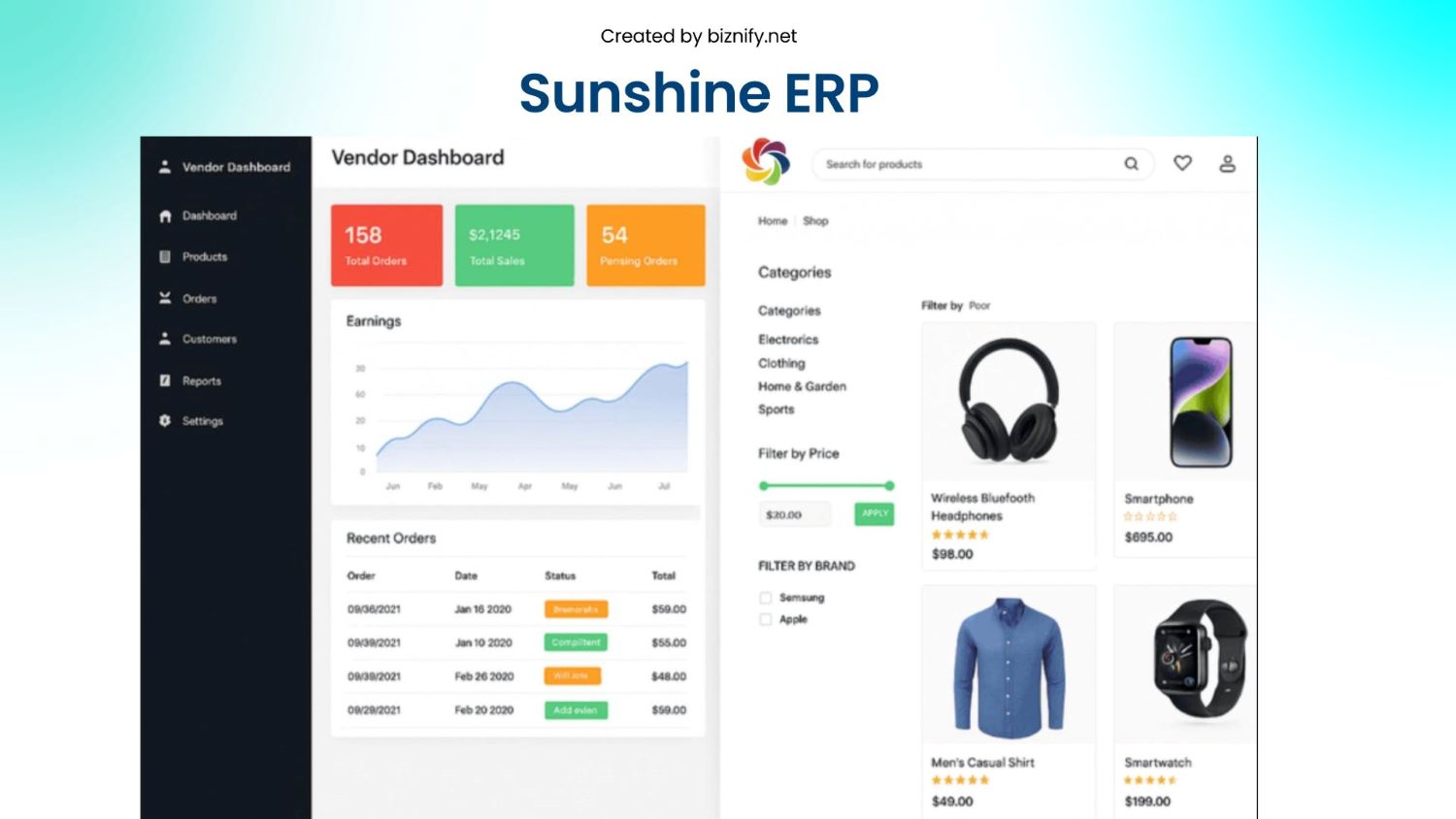
Sunshine ERP specializes in RMG (Garments) solutions, connecting merchandising with production planning. Sunshine ERP specializes in RMG (Garments) solutions, connecting merchandising with production planning in Bangladesh. It provides payroll, order tracking, and supplier management solutions specific to export-focused businesses.
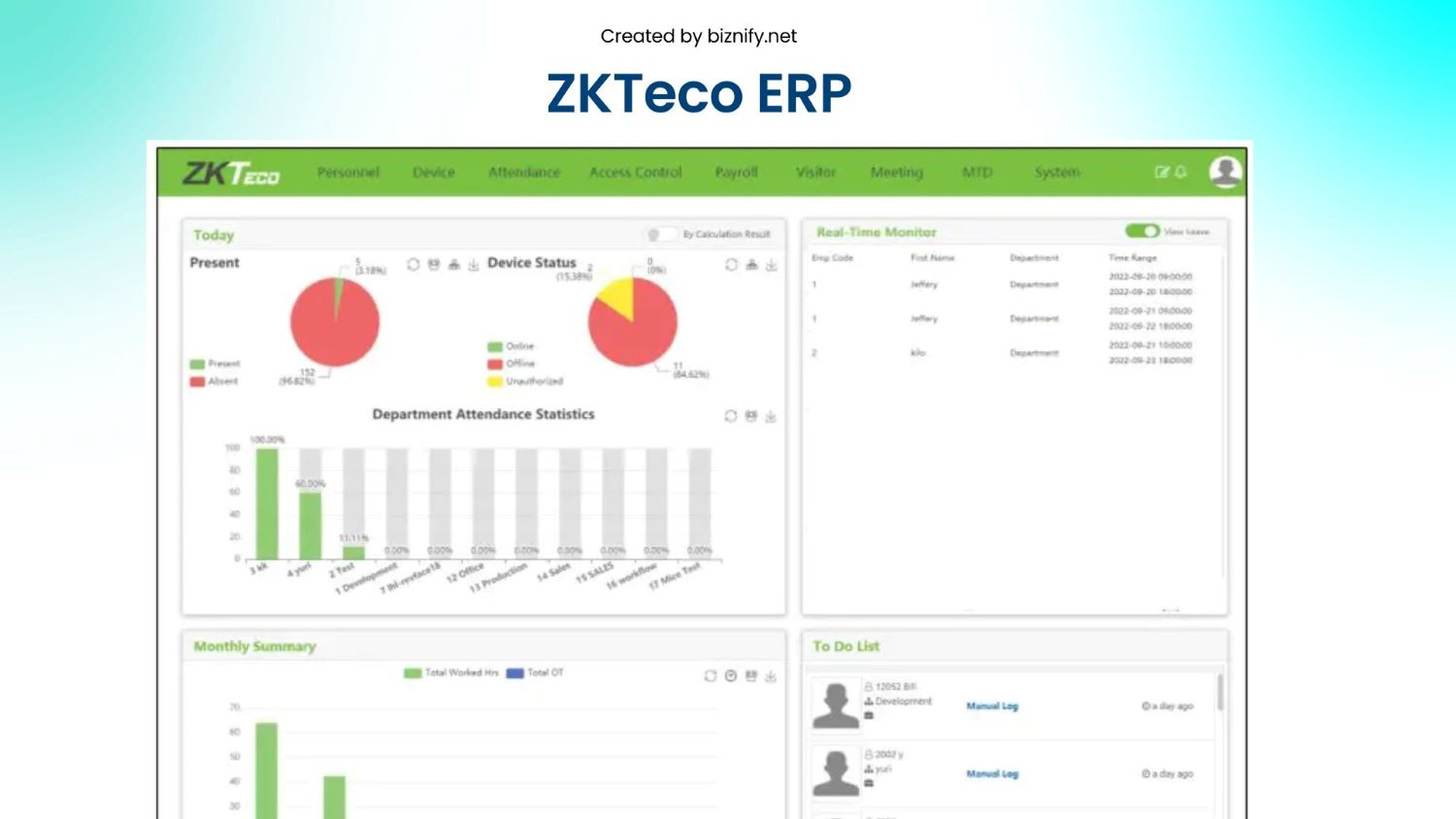
ZKTeco links biometric hardware directly to your Payroll module to stop fake attendance records and payroll management. It’s a good fit for factories or organizations needing secure HR automation in Bangladesh.
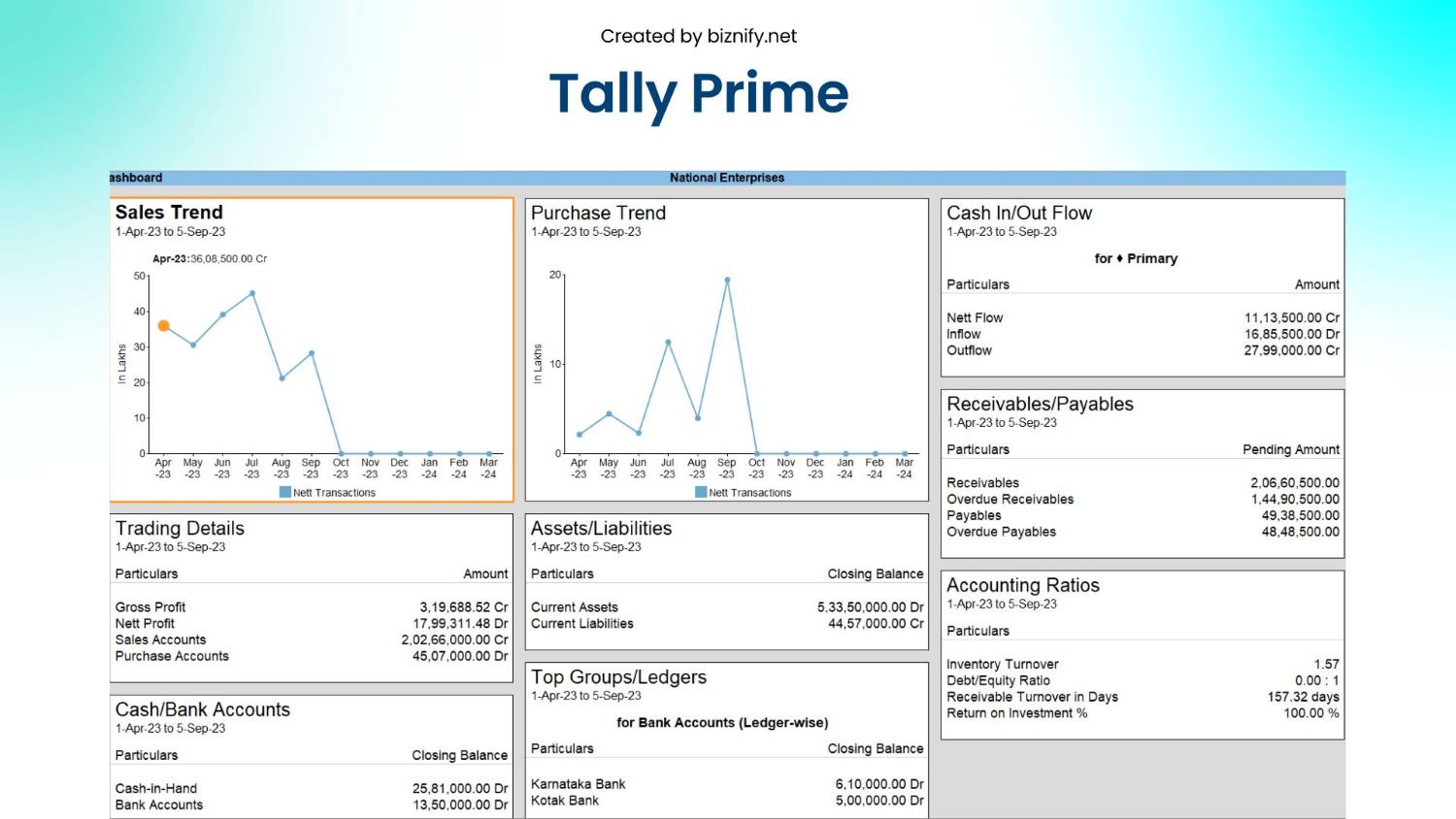
TallyPrime remains the industry leader for basic statutory accounting and maintaining a secure audit trail and basic inventory. It's beginner-friendly but lacks full ERP capabilities for businesses needing end-to-end solutions.
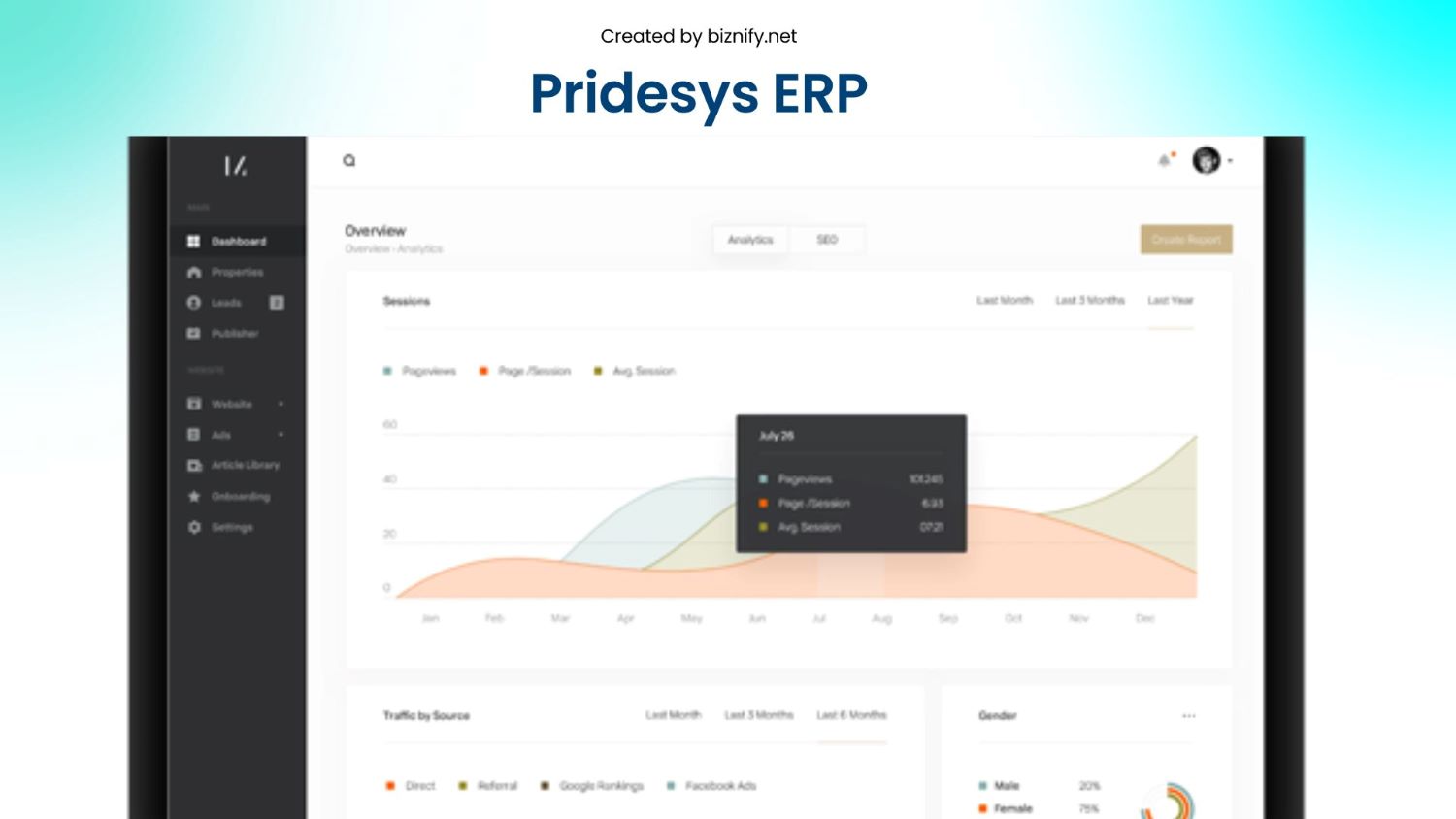
Pridesys ERP is designed for Bangladeshi manufacturers and factories, with features tailored to production management, procurement, and supply chain tracking.
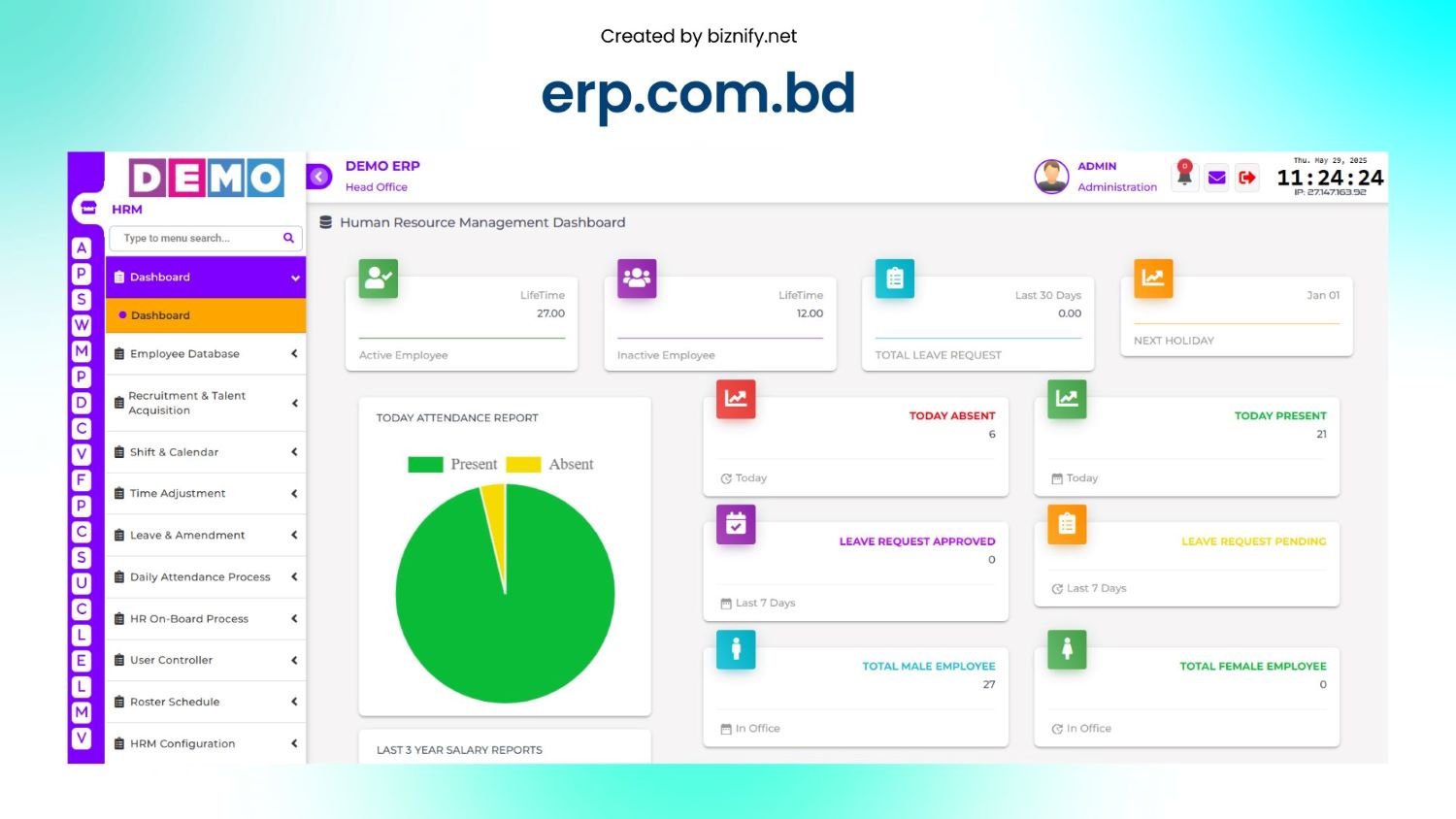
This cloud-based ERP suite includes CRM, Finance, and HR modules with localized features and support for Bangladeshi SMEs looking for web-first solutions.
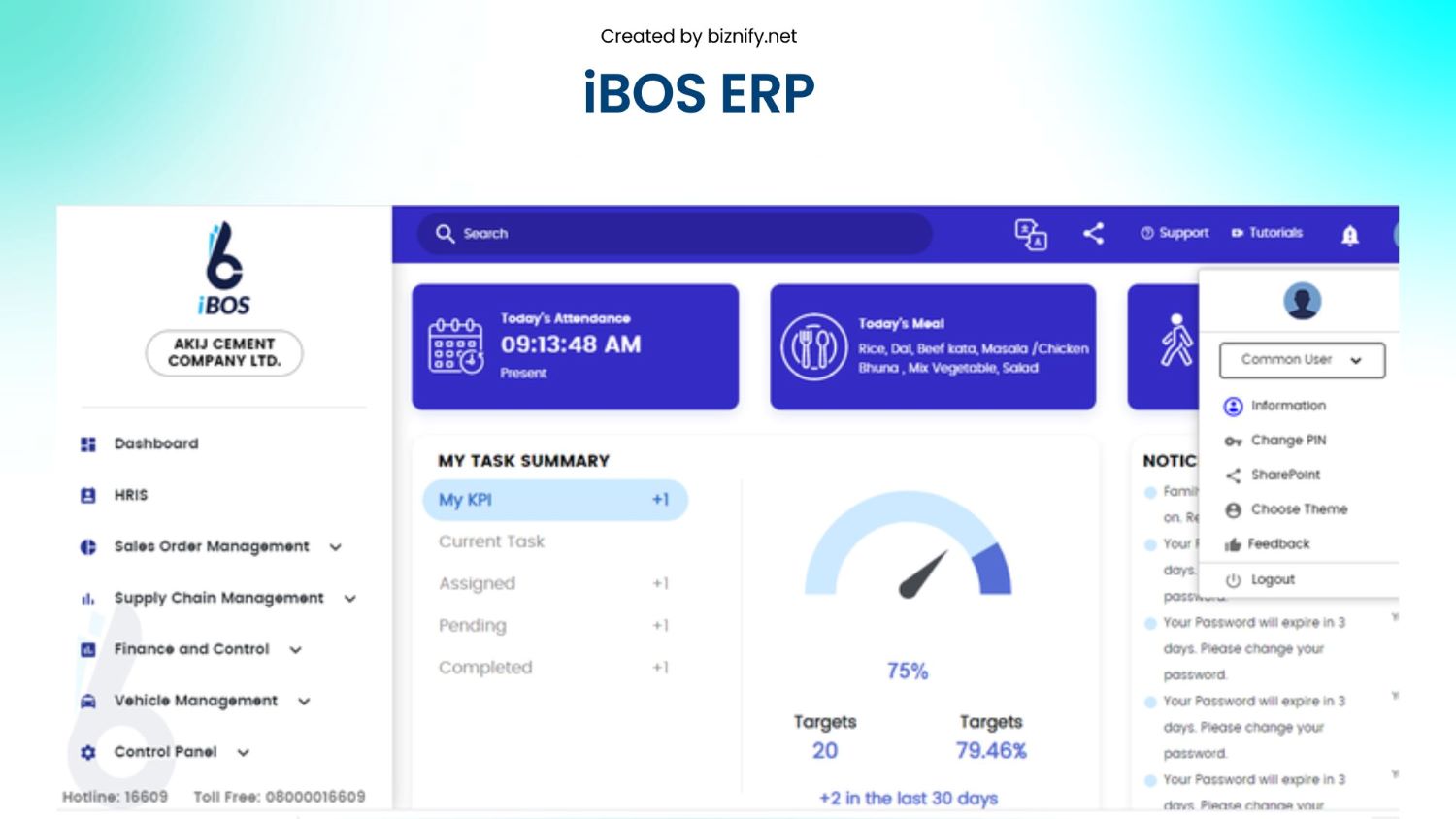
iBOS offers a lightweight SaaS ERP focused on easy Retail POS and keeping your inventory ledger straight to manage sales, purchases, HR, and stock. It’s ideal for first-time ERP users in Bangladesh.
Selecting the right ERP software isn’t just about picking the most feature-rich option. It’s about finding a system that fits your business, your team, your processes, and your reality in Bangladesh.
Here’s what to consider before making a decision.
Startups don’t need the same setup as large enterprises. A small business may prioritize ease of use and low cost, while larger teams need role-based access and deep reporting tools. Pick software that scales with your growth.
Some ERP tools are designed for manufacturing workflows, others for service-based or retail operations. If you run a shop, look for POS and stock sync. If you're in production, features like templates and work orders are key.
Some systems charge per user. Others offer flat pricing. Know how many people will use the system and check if the ERP supports user-level control or separate logins.
Many areas in Bangladesh still face inconsistent internet. Cloud ERP is convenient, but make sure it supports offline mode or local sync features if you’re in a low-bandwidth area.
If your team isn’t fluent in English, an ERP with a Bangla interface is not just helpful — it’s necessary. It reduces training time and helps everyone feel comfortable using the system.
Not all businesses are in major cities. Choose ERP software that performs well even on slower connections. Look for options that sync data later when the internet improves.
ERP needs vary depending on what your business does. A retail shop doesn’t work the same way as a factory, and a service provider has different goals from a wholesaler.
Here’s how ERP software fits different business types in Bangladesh:
Small and medium enterprises need easy-to-use tools that don’t require an IT team. The right ERP here should cover accounting, inventory, sales, and HR — all in one dashboard, without slowing down operations.
Busy retail shops need fast transaction processing to keep lines moving during peak hours. The solution must include an integrated POS with barcode scanning that automatically updates your warehouse stock, daily sales reports, and inventory alerts.
Wholesalers require tools for credit limit management, bulk orders, and managing stock across multiple warehouses, and large inventories. A good ERP solution should manage stock across warehouses, track supplier dues, and offer purchase order systems.
E-commerce businesses need a two-way sync that connects website orders directly to your inventory and delivery partners, stock, and delivery partners. ERP for e-commerce should integrate with online platforms, manage inventory, and generate payment reports.
Production-based companies need more than basic sales and stock. Essential modules include Bill of Materials (BOM) management and Work-in-Progress (WIP) tracking to monitor production costs, work orders, production status, and wastage reports.
From digital agencies to repair shops, service businesses need CRM, invoicing, and employee tracking. ERP should support project timelines, staff roles, and customer feedback.
Distributors need Fleet Management tools to plan delivery routes and track Last-Mile Delivery, delivery tracking, and stock transfers between locations. Multi-branch sync and performance reports are key.
International traders require ERP systems that handle multi-currency transactions, customs documents, and LC tracking. Shipping coordination and global pricing are must-haves.
Biznify offers industry-ready ERP modules tailored to these exact needs. From retail POS and manufacturing workflows to SME support and Bangla interface, it's designed to fit Bangladeshi businesses, no matter the sector.
ERP systems in Bangladesh are quickly evolving—not just to manage data, but to help businesses stay ahead. Here are the key ERP trends shaping 2025 in Bangladesh:
he shift to mobile-first design lets owners approve bills and check dashboard KPIs directly from their phones. Modern ERP tools are becoming app-friendly, allowing owners to check stock, approve payments, or view sales reports anytime, anywhere.
Instead of waiting weeks for software changes, many ERP platforms now offer low-code tools. This lets businesses customize workflows or dashboards without needing a developer.
AI is now being used for smarter reporting. ERP systems with built-in AI and LLM (Large Language Model) integrations can answer business questions directly, like “What were my top-selling products last week?”—through dashboards or chatbot-like interfaces.
Answer Engine Optimization (AEO) is influencing ERP design. Business reports are becoming more concise, real-time, and designed to answer exact queries, helping teams make faster decisions.
API connections allow your ERP to talk smoothly with third-party payment gateways and logistics companies, CRMs, or logistics tools. This flexibility means you can create a tech stack around your ERP instead of being locked into one ecosystem.
Bangladeshi providers like Biznify are already moving toward these features, focusing on mobile dashboards, customizable modules, and natural-language-ready reports.
More Bangladeshi businesses are replacing spreadsheets with ERP software—and it’s not just big companies making the shift.
Startups and SMEs in cities like Dhaka, Chattogram, Sylhet, and Rajshahi are looking for better control over inventory, accounts, and sales. With cloud-based ERP, they now get enterprise-level tools without the complexity or high cost.
Manual work creates delays. From invoice errors to missed delivery dates, many businesses are turning to ERP to avoid human mistakes and save time.
ERP software is helping businesses stay aligned with Bangladesh’s NBR reporting standards and compliance needs. Even smaller companies now prefer systems that generate financial reports and maintain clear audit trails.
From a retail shop in Banani to a wholesaler in Cumilla, syncing stock and sales across multiple locations is now essential. ERP tools give real-time data that teams can access from anywhere.
The adoption is growing not just for tech’s sake, but because business owners are seeing results. Solutions like Biznify have made ERP affordable and practical for the local market.
Biznify has become a go-to ERP platform for growing companies in Bangladesh, not just for ticking checkboxes, but because it actually works with how local businesses operate every day.
Many ERP systems assume everyone reads English fluently. Biznify doesn’t. It's fully Bangla-supported UI helps front-office staff, field-level users, and SME owners use the system without needing translations or extra training.
This makes adoption faster, especially for companies with mixed skill levels or remote branches.
Whether you're managing payroll, inventory, production, or sales, Biznify has built-in modules that handle daily operations from one place.
No need to juggle five different tools. Each module—like HR, Accounting, Manufacturing, and POS—is developed to reflect common business tasks in Bangladesh.
You can start with core modules, then add more as your business grows.
Biznify makes it easy to define who can see or do what inside the system.
This prevents data leaks, keeping your sensitive employee info and pricing strategies safe (like salary info or pricing), and keeps your team focused only on the tools they need.
For example, your sales team can manage leads, while your accountant only sees the finance modules.
One common complaint about ERP systems is hidden costs and long implementation times.
Biznify addresses this with clear pricing models and guided onboarding about price, so you don’t have to wait months to get started or worry about surprise fees.
SMEs can be up and running in weeks, not quarters.
Unlike foreign companies using remote call centers, Biznify provides direct access to local support teams, Biznify users get support from a local team that understands the business context in Bangladesh.
Whether it’s a quick setup question or a feature tweak, users get replies that are useful, relevant, and in Bangla if needed.
From branch-based access control to transaction records that match local accounting styles, Biznify is designed around how businesses operate in Dhaka, Chattogram, Narayanganj, and beyond. That includes compliance features, report exports, and formats familiar to accountants and admin teams in Bangladesh.
ERP success isn’t about picking a global brand—it’s about picking a system that understands your local workflow.
Biznify earns trust not by hype, but by making daily business simpler for Bangladeshi companies that want to grow with confidence.
Even the best ERP systems face real-world challenges during adoption. Here's what companies in Bangladesh often deal with—and how Biznify helps make the transition smoother.
Team members may be used to Excel or manual records. Biznify's simple, familiar interface and Bangla support make it easier for non-technical users to adopt quickly.
Moving historical data from old paper files or systems is often the hardest part of setup. Biznify offers easy data import tools to help you move your old records into the new system safely to move your existing records into the new system safely.
Without proper training, even good ERP software becomes frustrating. Biznify offers guided onboarding, tutorials, and local support so teams aren’t left guessing.
Some ERPs try to do too much at once. Biznify allows modular rollout—start with core modules like accounting and HR, then add more when ready.
Biznify includes role-based access and customizable workflows, allowing businesses to align the software with how they already work, rather than forcing change too fast. ERP adoption doesn’t have to be painful. With the right system and the right support, businesses in Bangladesh can transition smoothly and start seeing results faster.
Choosing ERP software is not just about features; it’s about how well it fits your business, your people, and your growth plan. In Bangladesh, that means looking beyond the tech specs and asking whether your team can actually use the system, get local support, and grow with it over time.
The right ERP should simplify operations, reduce bottlenecks, and help you make confident decisions based on real-time data. It should support your team, not confuse them. And it should adapt to your business as it scales, not slow it down.
If your business is ready to move beyond Excel and disconnected tools, now’s the time to act.
Ready to find the right ERP software in Bangladesh? Explore Biznify ERP with a free demo today.
ERP software is a system that helps businesses manage core processes like accounting, inventory, HR, and sales from a centralized platform.
Biznify ERP, PrismERP, and Odoo are among the top choices in 2025, offering robust features, local support, and affordable pricing.
ERP software in Bangladesh typically starts at ৳10,000/year for basic versions and can go beyond ৳100,000 depending on features and users.
Yes, Biznify ERP and PrismERP provide Bangla user interfaces and localized modules tailored for Bangladeshi businesses.
Biznify ERP and ERPBee are ideal for SMEs due to their scalability, ease of use, and affordable SaaS pricing.
Yes, PrismERP and XERP offer garments-focused modules including compliance, production, and order tracking.
Modern ERP systems like Biznify and Odoo offer cloud-based solutions with easy interfaces that require minimal technical skills.
Biznify ERP, iBOS ERP, and ERPBee offer cloud-based SaaS models suitable for startups and growing SMEs.
Common ERP modules include Accounting, Inventory, HR & Payroll, CRM, Manufacturing, POS, and Supply Chain Management.
SoftifyBD (Biznify ERP), Divine IT (PrismERP), iBOS, and Southtech are notable ERP providers in Bangladesh.
Yes, most ERP solutions like Biznify and PrismERP offer automated invoicing and payment tracking features.
Yes, local ERP providers like Biznify and PrismERP allow module customization to fit specific business needs.
ERP includes accounting features but also manages inventory, HR, CRM, and more — offering a complete business solution.
Yes, trusted ERP providers use encryption, backups, and user role permissions to protect sensitive business data.
Yes, many ERP systems like Biznify offer mobile-friendly dashboards and apps for on-the-go management.
ERP Implementation can take from a few days to several weeks depending on business size, customization, and training.
Yes, many providers, including Biznify offer free trials or demos to explore core features before purchasing.
Odoo is a popular open-source ERP used in Bangladesh, especially among developers and tech-savvy teams.
Biznify ERP and iBOS ERP offer retail-specific modules like POS, inventory sync, and customer management.
Absolutely. ERP systems provide real-time data and analytics, helping business owners make faster, data-driven decisions.
Get a guided product demo tailored to your business needs. No assumptions. No generic walkthroughs. Just real use cases.
Just exploring ERP or unsure which modules you need? The Biznify team’s here with straight answers.